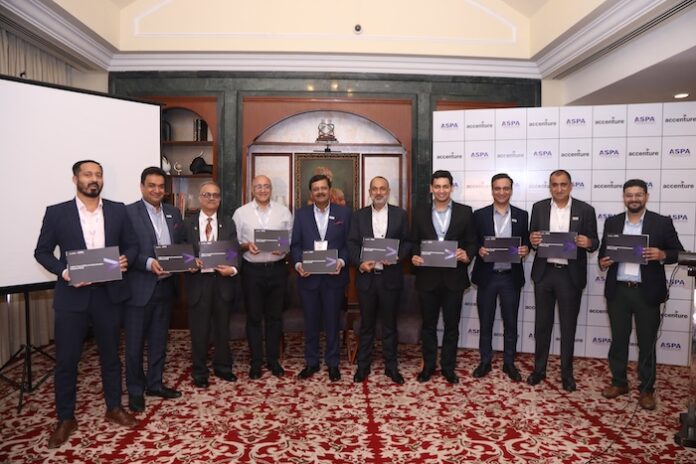The Authentication Solution Providers’ Association (ASPA), in partnership with Accenture, recently launched a detailed study on India’s Authentication & Traceability (A\&T) industry. The report presents an analysis of the current market landscape, growth trajectory, technology adoption, and policy environment shaping India’s fight against counterfeiting and illicit trade.
The report estimates the Indian A\&T industry at Rs 9,705 crore (US$1.091 billion) in FY 2023-24, growing at a CAGR of 7.4% since FY 2019-20. The sector is projected to reach approximately Rs 10,612 crore (US$1.196 billion) in FY 2024-25 and Rs 16,575 crore (US$1.86 billion) by FY 2028-29, reflecting a strong upward trajectory with a forecasted CAGR of 11.3%.
The report identifies key sectors driving demand in India, including pharmaceuticals (17%), consumer products (14%), cosmetics (13%), and automotive components (13%). Factors such as the rise in counterfeiting, growing eCommerce penetration, consumer awareness, and regulatory requirements are contributing to the sector’s growth.
While traditional technologies such as holograms and QR codes continue to dominate, the study highlights growing interest in next-generation technologies such as blockchain, IoT, AI, and phygital (physical + digital) solutions.
Manoj Kochar, president, ASPA, addressing the event, said, “This report is a milestone for India’s fight against counterfeiting. Authentication and traceability are no longer optional; they are essential to protect consumers, safeguard brands, and build trust in the marketplace. With India’s A&T industry set to grow at double-digit rates, this study will guide policymakers, businesses, and stakeholders in shaping a safer, more transparent future.”
Rajat Wahi, partner, Deloitte India, pointed in his presentation that, unlike in developed markets, India lacks a centralized body to publish data on counterfeiting and A\&T adoption. “That was one of the core objectives of this report—collating data to help the industry and policymakers understand the scale and growth trajectory,” he said.
The report and expert discussions underscored the alarming prevalence of counterfeit products in India. Estimates suggest that 12-15% of FMCG goods could be counterfeit, representing billions in lost value and tax revenue. In some categories, such as alcohol and tobacco, counterfeits may account for up to 50% of sales.
eCommerce, which now accounts for 10-12% of India’s retail market, has become another high-risk channel. Surveys reveal that 25-38% of consumers reported receiving fake products online. “This is not just a brand problem, it is a massive economic and health issue for the country,” Wahi cautioned.
From his enforcement experience, Keshav Kumar, a retired IPS officer, confirmed that counterfeiters are increasingly sophisticated, using AI, high-quality printing, and organized crime networks. He recalled a case in Agra where Rs 3 crore worth of fake medicines were seized, many of them carrying cloned QR codes that were supposed to guarantee authenticity.
Physical versus digital authentication
The study revealed that India’s A\&T industry is still heavily reliant on physical security technologies such as holograms, security inks, and labels. These are cost-effective and easy to implement, especially in rural markets.
However, Wahi emphasized the growing role of digital tools such as QR codes, blockchain, AI, and digital traceability platforms, which are expected to be the next growth drivers. With rising smartphone penetration, digital literacy, and social media awareness, more consumers are engaging with these solutions.
At the same time, he remarked that ‘digital is not without challenges’. Counterfeiters have already begun cloning QR codes, while cybersecurity risks threaten trust in digital systems. “Digital cannot replace physical solutions entirely. Given that 55-70% of consumption is still rural, the mix of physical and digital authentication will remain essential,” Wahi noted.
According to Kumar, the most urgent gap lies in law enforcement and judicial conviction rates. He drew attention to the fact that while India’s conviction rate for conventional crimes is around 34%, it is as low as 3% for counterfeiters.
“The solutions must withstand judicial scrutiny. If it does not, it means we are not tamper-proof and cannot possibly prove it in a court of law,” Kumar said. He stressed the importance of forensic validation of A\&T solutions, arguing that only evidence backed by forensic science can secure convictions.
He said ASPA can collaborate with the National Forensic Sciences University (NFSU) in Gujarat, which specializes in areas such as ink analysis, document examination, biometrics, and digital forensics. Solutions certified by NABL-accredited laboratories could carry greater weight in courts.
Awareness and social media
Both speakers highlighted the growing role of consumer awareness in driving the adoption of authentication solutions. In today’s world, even a minor counterfeit scandal can go viral, damaging brand reputation overnight.
“When we talk to CEOs, we ask what keeps them awake at night. They said it’s the fear that by the time they wake up, a fake product scandal could go viral on social media,” Wahi said.
Kumar, meanwhile, emphasized the need for ‘rural forensics’ that equips farmers and rural consumers—often the most vulnerable to fake seeds, agrochemicals, and medicines—with tools to detect counterfeits. “Does your solution reach the lowest people in rural areas? That is where awareness is most needed,” he remarked.
Policy implementation and collaboration
Despite the threat, many companies remain reluctant to adopt A&T solutions. According to Wahi, the reasons include reputation risk, enforcement costs, and low ROI. This reluctance, he mentioned, makes policy intervention critical. “It’s not something that can be left to self-regulation alone,” he stressed.
According to both experts, government enforcement and policy advocacy are crucial to scaling the industry. Wahi called for greater cross-departmental collaboration involving consumer affairs, police, health, and state governments. He asked the media to play a bigger role in spotlighting the issue and pushing for reform.
Wahi, in his concluding words, said, “The risks of counterfeiting are not just commercial, they are economic, health-related, and reputational at a national level. The time for collaborative, technology-enabled, and government-supported action is now.”
The study conducted by Accenture is based on survey responses from ASPA member companies, along with in-depth interviews with government authorities, industry stakeholders, and global bodies. It presents a data-driven overview of how authentication and traceability technologies are being used across sectors to address risks related to counterfeit goods and product integrity.
The report aims to guide policymakers, regulators, and business leaders in designing robust, scalable authentication frameworks tailored to India’s evolving product security landscape.











